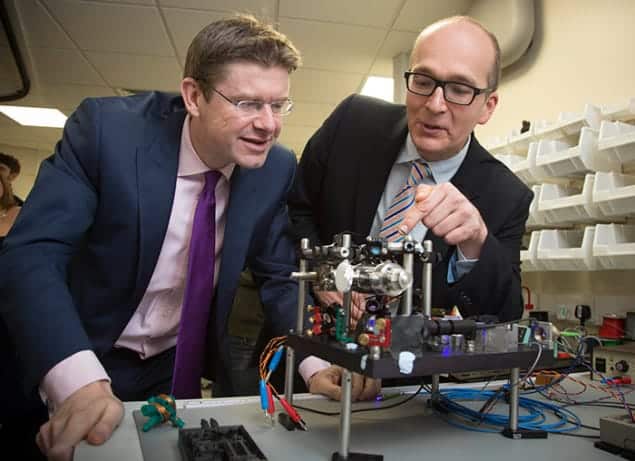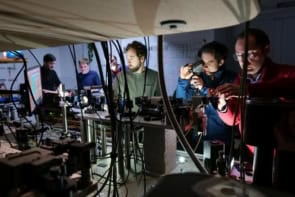
The UK has released a national strategy to stimulate growth in quantum technologies. Announced last month by the Quantum Technologies Strategic Advisory Board (QTSAB), the plan outlines five actions that, if implemented, would allow the UK to capitalize on the country’s R&D in quantum technology. The QTSAB is chaired by David Delpy, a former head of the UK’s Engineering and Physical Sciences Research Council (EPSRC), and has 12 members from UK industry and academia.
The first action, which was already announced late last year, is the establishment of a national network of technology hubs that involve 17 universities and more than 50 industry partners. So far, £120m has been promised to the hubs from the UK government with an additional £60m from industrial partners. The hubs are part of the £270m National Quantum Technology Programme, which is overseen by the QTSAB, that was established in 2013 to encourage the growth of industries based on technologies such as quantum encryption and quantum metrology.
Demonstrating commercial products
The second action involves stimulating the development of commercial applications and markets for quantum technologies. This will be done by providing public funds to build “demonstrators” of potential commercial products, and through the creation of a roadmap for the future development of quantum technologies. “Quantum technologies stand to offer industry truly revolutionary capabilities in key areas,” says Trevor Cross, chief technology officer at e2v, a UK firm that develops RF power, imaging and semiconductor technologies, and is involved with the National Quantum Technology Programme. According to Delpy, a related goal is the development of quantum components that can be integrated into new products by a “competent engineer”, rather than a highly specialized quantum physicist.
Another action identified by the board is the need to grow a workforce that is skilled in the development of quantum technologies. To achieve this goal, £15m of the £270m will be devoted to training the next generation of quantum engineers through the funding of PhD students by ESPRC. “Quantum skills will allow us to bring game-changing advantages to future timing, sensing and navigation capabilities, in a sector that could be worth more than £1bn to the UK economy,” says Greg Clark, who is the UK’s universities, science and cities minister.
The QTSAB also says that the UK quantum-technology community should undertake an “early and broad engagement with UK society” to ensure that the industry grows in a responsible manner with the creation of effective regulatory and standard regimes.
Balancing international collaboration
The fifth and final action is to maximize the benefit to the UK through international collaboration. The QTSAB warns that several other countries have already established centres of excellence for quantum technologies, and that UK researchers and businesses need to strike a balance between international collaboration and supporting the development of home-grown research and development efforts.
Cross told physicsworld.com that e2v is particularly interested in the commercial development of quantum-metrology technologies that fit in with the firm’s expertise in vacuum technology. He says that sensors based on ultracold atoms, for example, could be used in a range of applications from navigation systems that do not rely on GPS satellites to gravimeters used by civil engineers for detecting underground features such a potential sinkholes along a stretch of road. He believes that demonstrators of these products will be available in two to three years, and that specialized products could be on the market in five years.



